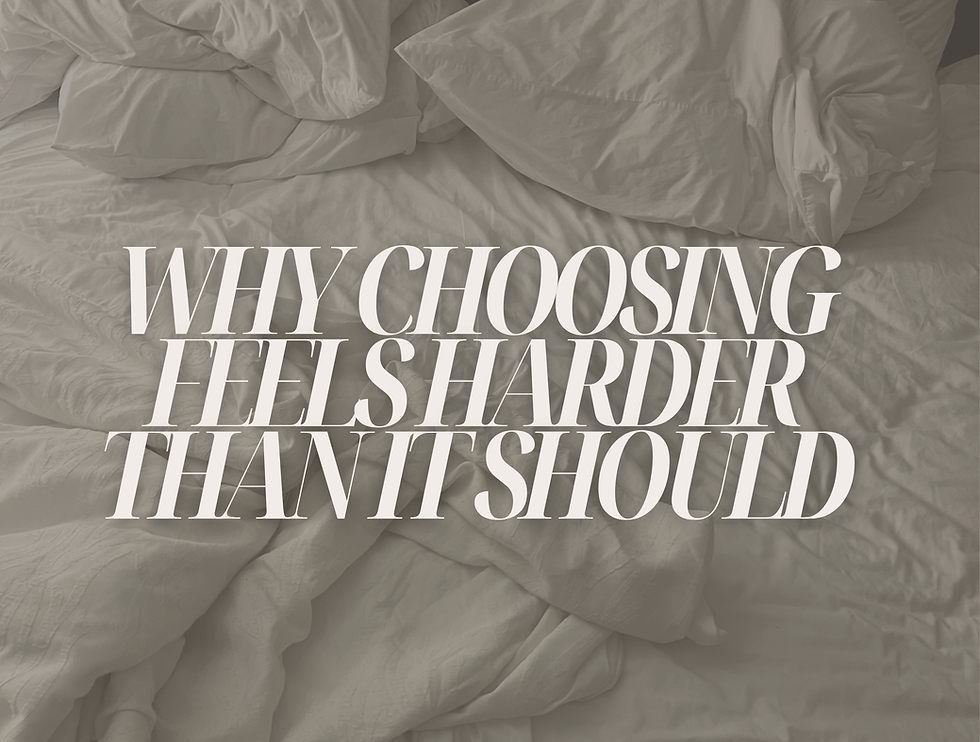Decision Fatigue: Why Choosing Feels Harder Than It Should
- Jenny Price

- Aug 14, 2025
- 3 min read

Ever find yourself staring at your wardrobe, your inbox, or the takeaway menu and thinking, “Why is this so hard?” You’re probably not lazy or indecisive, you’re likely experiencing decision fatigue.
What is Decision Fatigue?
Decision fatigue happens when your brain gets tired from making too many choices. Each decision, big or small, takes a little mental energy. Eventually, your ability to think clearly and make good choices dwindles. This can leave you feeling drained, cranky, or like every little decision is an exam didn’t study for.
It’s why at the end of a long day you might find yourself:
Snacking on whatever’s easiest rather than what you planned
Scrolling endlessly on your phone
Saying yes to things you normally wouldn’t
Avoiding decisions entirely
Even seemingly trivial choices, like what to wear, which email to answer first, what to cook for dinner, all add up.
Why It Happens
Your brain has a limited supply of self-control and cognitive energy. Each choice taps into this reservoir, so the more decisions you make, the less fuel you have for the next one. Decision fatigue isn’t a flaw, it’s just your brain signaling that it needs a break.
Signs You Might Be Experiencing Decision Fatigue
Feeling mentally exhausted before the day is over
Making impulsive or “easy” choices rather than thoughtful ones
Procrastinating on even minor decisions
Irritability or heightened stress
Why Is Decision Fatigue Coming For Me?
Some of us are more prone than others to decision fatigue, especially if you’re:
Juggling multiple roles: Work deadlines, social obligations, family responsibilities, self-care… it’s a lot.
Emotionally invested in your decisions: Decisions about relationships, parenting, or personal growth can take an emotional toll.
Perfectionist or people-pleaser: When every choice feels like it must be perfect or please everyone else, it drains mental energy faster.
Chronically busy or overstimulated: Constant notifications, social media scrolling, and packed schedules keep your brain in overdrive.
If this sounds familiar, you’re definitely not alone, and it’s not your fault.
How to Combat Decision Fatigue: The 24-Hour Decision Detox
Here’s a simple exercise to reset your brain and reclaim mental energy: a decision detox.
Step 1: Identify decisions you can remove or postpone
Can someone else pick the movie tonight?
Can you eat the same breakfast or lunch?
Can non-urgent emails wait until tomorrow?
Step 2: Automate repetitive tasks
Lay out your outfit the night before
Use recurring food shop delivery or meal prep
Set default choices for things like coffee or snacks
Step 3: Outsource what you can
Ask a partner or friend to choose the playlist
Delegate tasks at work
Accept help from family when it’s offered
Step 4: Notice the difference
Check in with yourself: how much lighter or calmer do you feel when you remove unnecessary choices?
Observe how freeing it is to have mental space for the decisions that really matter.
Support Your Brain with Proper Rest
Decision fatigue is easier to manage when your nervous system is rested. Tools like sleep hypnotherapy or guided relaxation can help you replenish your mental energy so that even small choices feel easier.
Decision fatigue is normal, especially in today’s choice-saturated world. It’s not a personal failing, it’s a signal to give your brain a lil break! A bit of structure, automation, and self-kindness can go a long way toward reclaiming clarity, calm, and energy.



Comments